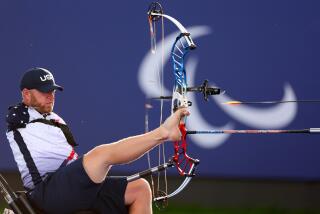He’ll Compete, Even If Unofficially : Triathlete Eyes Ironman Contest From His Wheelchair
- Share via
Two days after a motorcycle malfunction on Sunset Boulevard in Bel-Air threw Jon Franks into a metal pole at 50 m.p.h., he made a promise:
“Everyone was in my room crying, and I thought, what’s everyone so upset about? I said, ‘Calm down, guys, I’m going to do the Ironman. I’ll show you.’
“For some reason, I picked that event. I guess I needed something else to go after.”
Three years later, paralyzed and in a wheelchair, he still intends to keep his promise--even if he has to enter the event unofficially.
The Ironman Triathlon Championship is a grueling race that includes a 2.4-mile ocean swim, a 112-mile bike race followed by a marathon. Held annually in October in Hawaii, the event accepts 1,300 athletes and turns away 2,000 others. Wheelchair athletes have never been allowed to compete.
Rejection’s ‘Discrimination’
Franks, who has tried to enter for the first time this year, calls his rejection “extreme discrimination. I don’t want to be a viable competitor, I just want to do a demonstration like they do for the Olympics. It’s to show people, ‘Hey, you can’t stop us. . . .’
“I’m not sure what the bottom line motivation is for putting me off,” he said. “I think they really just don’t want to take the time or the consideration to mess with it. . . .”
An Ironman official was adamant about not allowing wheelchair athletes to compete for safety reasons.
“This isn’t your usual kind of race,” said Valerie Silk, president and race chairman, adding that all three events carry risks, even for able-bodied athletes. “The run is one of my biggest concerns. When the sun goes down in Kona, it’s like the lights turn out in the whole world. It’s just not safe to have people in wheelchairs going 15, 20 miles an hour on the road, when you have people running and shaking cups of ice to try to be heard by the other runners out there.”
Added Silk: “I’m not willing to risk the safety of other participants in the race to try to accommodate people in wheelchairs.”
She said she receives two or three applications a year from wheelchair athletes. Despite some talk of allowing them, Silk is “not willing to let someone else run their race in the middle of our race. I don’t feel the Ironman is under any obligation to provide a stage for the promotion of personal goals.”
A Type-A Personality
At 31, Franks is a successful businessman, a Type-A personality who often puts in 15-hour days. He is a chiropractor and owner of Lifeforce, a sports medicine facility in Century City. Among his clients are members of the Lakers, Eric Dickerson of the Indianapolis Colts and ex-boxer Ken Norton.
Over breakfast at the Sports Deli near his office, Franks talked about channeling his competitive nature into wheelchair sports, including testing innovative equipment sent to him by various manufacturers. The device he has been testing and hopes to use in the bicycle part of the Ironman is the Rowcycle, which uses levers to propel it.
He juggles his work at the center with a training schedule that includes swimming, weight training and working out with the Rowcycle in the pre-dawn hours on the bicycle paths at Venice Beach.
“I will complete the event. There’s nobody for me to compete with,” he said with the assurance of an athlete unaccustomed to defeat. He paused, as if playing back what he just said, and chuckled softly. “I’m a hard head. And I’ll have plenty more events to do after this one.”
Athletics and competition come naturally for trim, muscular Franks, who played semipro basketball in summer leagues in Inglewood and before that in Washington. He also played football, volleyball, tennis, golf and swam.
He entered his first wheelchair race 1 1/2 years after his accident. It was half a marathon (13.1 miles) in Santa Monica. Franks had no racing wheelchair, no protective gloves and his tires were improperly inflated.
Thoroughly Humiliated
“I did it on a dare from a girl racer,” he says with a laugh. “It took me around two hours to finish. I almost died. She beat me by five minutes and I was thoroughly humiliated.”
Two months later, Franks entered the Houston-Tenneco Marathon. He went six miles on a flat tire but finished the race in just under three hours. After that he competed in smaller races, then did the L.A. Marathon last spring, shaving half an hour off his time.
He credits Candace Cable-Brookes, one of the top female wheelchair racers in the country, and her husband, Peter Brookes, with making him a savvy competitor. Cable-Brookes and her husband met Franks at the Honolulu Marathon, which ultimately was canceled because of a typhoon. “He was pretty sure of himself,” she recalled.
She said Franks has been coached by her husband, an expert in training handicapped racers. Franks, she noted, seemed to be inspired by her athletic successes: “I think that since I am one of the fastest women, that’s usually inspiration for a lot of guys to beat me.”
Cable-Brookes, who lives in San Luis Obispo, has asked Franks to accompany her to the Olympics in Seoul (where she is to compete in the 800-meter wheelchair race) to assist with training and physical therapy. Franks wanted to compete but could not because of a hand injury.
“Jon is really motivated,” she said, “and he really wants to be the best of anything that he does. If he puts his mind to it, he can become one of the best.”
More to Read
Go beyond the scoreboard
Get the latest on L.A.'s teams in the daily Sports Report newsletter.
You may occasionally receive promotional content from the Los Angeles Times.







